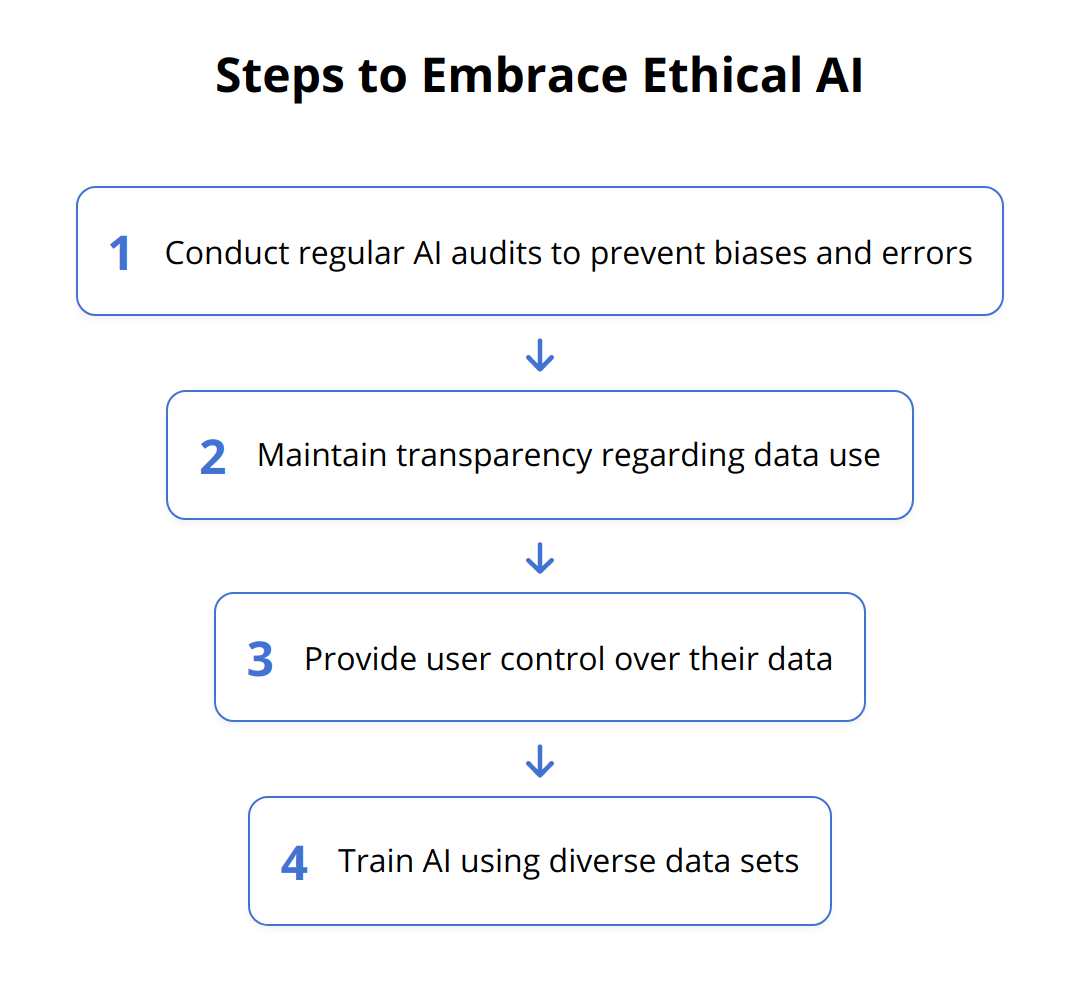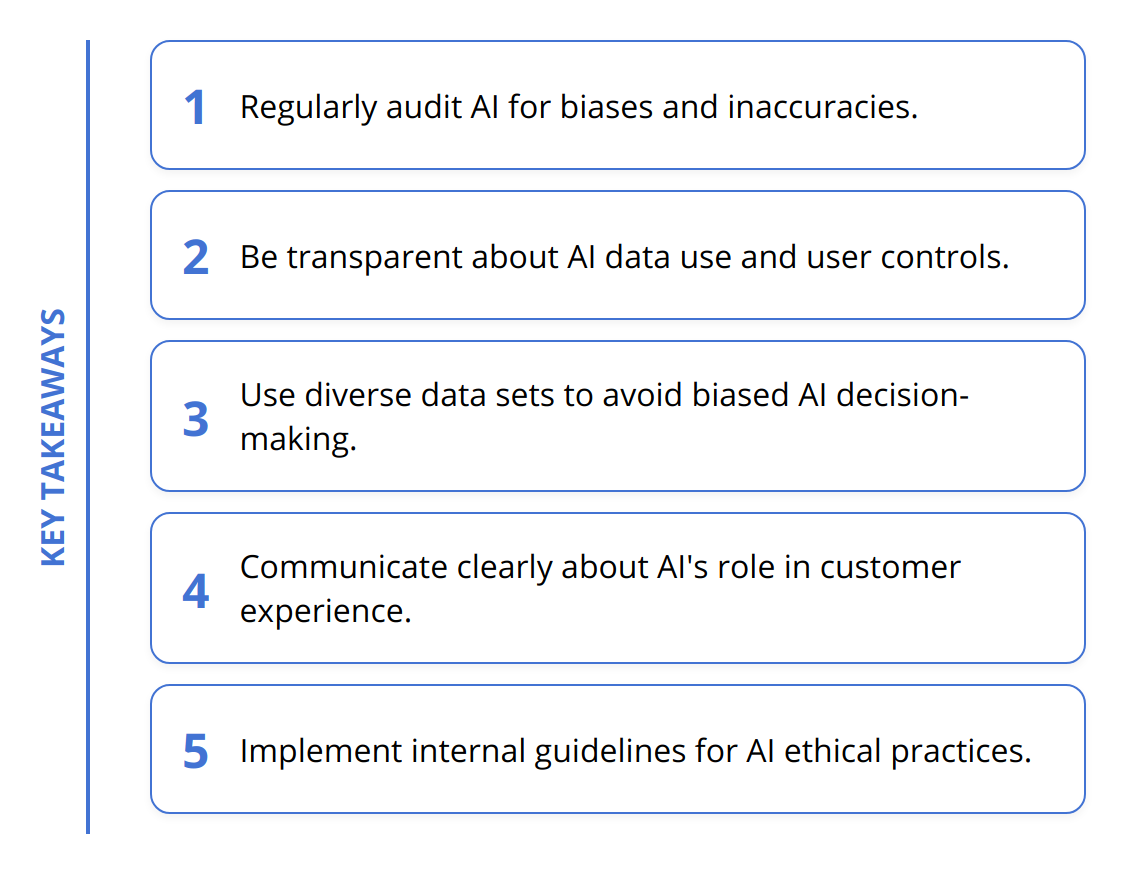Ethical AI in marketing isn’t just a good practice; it’s essential for the heart of your brand. At Emplibot, we understand that integrating artificial intelligence into your marketing strategies demands a strong ethical framework.
Establishing trust and protecting your brand’s reputation requires a commitment to fairness and transparency. Read on to see how ethical AI marketing can contribute to long-term success and align with both consumer expectations and legal standards.
Ethical AI: Why Does It Matter?
Ethical considerations in AI marketing are becoming the backbone of brand strategies. Consumers are savvy; they recognize when a brand uses their data responsibly to improve user experience, and conversely, when their data might be exploited. This discernment shapes their trust in a brand. Moreover, a brand’s image hinges not just on the quality of products or services but also on the ethical stance it takes, especially when it comes to technology such as AI.
Building Consumer Trust:
In an age where data breaches are all too common, demonstrating a commitment to ethical AI practices is more than just a nice-to-have. Adhering to privacy regulations such as the General Data Protection Regulation (GDPR) or California Consumer Privacy Act (CCPA) is a start but going beyond compliance and being transparent about AI algorithms and data usage can solidify consumer trust. As data is increasingly seen as currency, customers want to know that their information is in safe hands.

Safeguarding Your Brand’s Image:
Bias in AI can lead to public relations nightmares – remember the backlash against certain image recognition services? Companies need to regularly audit their AI systems to ensure they are free from such biases and inaccuracies. This not just protects the brand from potential scandals but also reinforces a brand image built on integrity and respect for the customer.
Meeting Expectations and Legal Requirements:
Consumer expectations are rising, and they now demand personalized experiences that don’t compromise their privacy. Ethical AI practices are fundamental here. Likewise, legal standards are tightening, and non-compliance can be costly, not just in terms of fines but also long-term customer relationships.

To genuinely embrace ethical AI, brands should:
-
Conduct regular AI audits to identify any unintended biases or errors.
-
Maintain transparency with users about how their data is used.
-
Offer opt-outs and controls to users regarding their data.
-
Train AI systems with diverse data sets to avoid biased decision-making.
Ultimately, the commitment to ethical AI is no fleeting trend. It’s a foundational element of brand integrity in a digital age. For deeper insights, explore the role AI plays in marketing with our post on AI in marketing. Brands that recognize the value of ethical AI are the ones that will flourish, creating lasting relationships with their customers and staying ahead in the competitive marketplace.
Addressing AI Bias
Recognizing the flaws in artificial intelligence systems is as important as harnessing their potential. AI bias, while an unintended product of algorithmic design, can tarnish the reputation of any brand if left unchecked. Ethical AI marketing hinges on acknowledging and mitigating these biases to foster equitable customer experiences.
Understanding the Roots of Algorithmic Bias
Bias can sneak into AI algorithms via the data they are trained on or the way they are programmed. It stands as an unintentional deterrence to fairness, often reflecting historical prejudices or a narrow subset of cultural norms. Brands must understand that any decision made by AI can be skewed if the underlying algorithm has been fed biased data.
Here are actionable steps for brands:
-
Scrutinize the initial data sources: Where does your data come from? Is it representative of the population you serve?
-
Question the representativeness: Does your data set properly reflect the demographic diversity of your audience?
-
Pinpoint potential bias: Analyze your AI outputs for patterns that may be indicative of bias.

Regular Audits: Keeping AI in Check
For AI to remain a beneficial tool, regular audits are essential. These audits should not only look for technical inaccuracies but also for ethical inconsistencies. By implementing a schedule for detailed checks, your brand advocates for the ongoing integrity and fairness of your AI applications.
Key things to remember:
-
Audit frequency: Determine an auditing timeline that corresponds to your AI’s learning cycle and update frequency.
-
Employ external auditors: Objective, third-party reviews can provide unbiased insights.
-
Action on findings: It’s critical to act swiftly to correct any issues identified in audits.
Practical tools and guidelines, such as those discussed in our post on AI marketing tips, can provide the framework required for consistent and effective auditing.

Inclusive Data Sets: The Bedrock of Fair AI
Commitment to diversity and inclusivity extends into the digital realm of AI as well. Diverse data sets ensure that AI systems function equitably and serve all customer segments without prejudice. This means collecting and using a wide-reaching and comprehensive range of data that captures the heterogeneous nature of the market.
Tips for creating diverse data sets:
-
Collaborate with diverse teams to ascertain comprehensiveness.
-
Continuously expand your data sources to elevate diversity.
-
Vigilantly review the data gathering process to eliminate exclusionary practices.
By fostering AI systems on the pillars of inclusive and unbiased data, brands thwart the risks associated with AI bias and champion the trust of their customers. Transparency in tackling AI bias can be a strategic advantage. It positions a brand as committed to ethical practices and pushes the envelope towards a more equitable digital space.
The journey towards ethical AI is not only strategic but is also reflective of a brand’s core values. In the next chapter, we continue to explore ways ethical AI is revolutionizing the marketing landscape for the better.
AI Marketing Transparency
In the realm of AI-driven marketing, transparency with your customer base is critical. You must communicate clearly about AI use to maintain reputation and consumer confidence. Customers rightly expect to understand how their data propels the marketing they encounter.
Clear Communication Is Key
Users’ inbox and social media feeds are curated by algorithms that learn from behavior. Brands must be open about this reality. It isn’t enough to simply use AI; brands have to articulate its role in enhancing the customer journey. A practical step is to provide easily accessible explanations on how AI shapes their experience, be it on a company’s FAQ page or within a privacy policy. Companies like Netflix and Spotify excel in personalization while explaining how user data informs recommendations.
Data Handling and Privacy Respect
You’ve got to walk a delicate line with customer data. The data is not just a resource – it’s personal, sensitive, and in many cases, protected by law. Create systems that respect user privacy by default. Data minimization, where a brand only collects the data necessary for a particular purpose, is an excellent guideline to follow. This helps prevent misuse and ensures that, in the event of a breach, exposure is limited. For reference, Apple’s commitment to limiting data collection has set a standard that resonates with privacy-focused consumers.
Swift Action to Rectify Mistakes
When things go wrong—and they sometimes will—how you respond is paramount. Quick, effective remedies for any AI missteps reveal a lot about brand ethics. Domino’s Pizza, when faced with accessibility issues on their website, responded by improving their digital platforms to be more inclusive, setting an example for swift correction of unintended tech consequences.
AI marketing is undeniably powerful, but with that power comes the responsibility to use it ethically, prioritizing the trust and respect of customers above all else. The journey doesn’t end with a one-off audit or a single transparency report. It’s an ongoing commitment to authenticity and openness in every AI interaction.
How to Implement Ethical AI Marketing?
Building a sound ethical AI marketing strategy is fundamental for businesses that want to lead with integrity and innovation. Ethical guidelines, comprehensive evaluations, and enhancing human creativity with AI are more than practices—they’re commitments that set industry leaders apart.
Solidify Your Ethical Foundation with Internal Guidelines
A strong ethical AI marketing framework starts within an organization. Developing clear internal guidelines is imperative. These rules are not just for compliance; they inspire confidence within your team and among your customers. Create a robust ethical charter that encompasses:
-
Data privacy protection
-
Fairness in AI application
-
Immediate response protocols for breaches or missteps
-
Consistent training for employees on AI ethics
Employees are the backbone of ethical practices. Continuous learning opportunities about the latest in AI ethics not only empower your workforce but ensure that the company remains at the forefront of responsible marketing.
Stringent Evaluation Process for AI Tools
The selection of AI tools requires meticulous examination. All too often, exciting features overshadow the assessment of ethical implications. It’s essential to conduct due diligence on potential AI solutions, considering:
-
The vendor’s commitment to AI ethics
-
The tool’s performance history in bias and error correction
-
A rigorous testing period to expose any ethical vulnerabilities
-
Transparency in algorithms to ensure they meet ethical criteria
Tools like predictive analytics demand thorough scrutiny, not just for their efficiency but for their equitable treatment of data, which we discuss in our guide on predictive analytics in marketing.
AI as a Catalyst for Human Creativity
The synergy between AI and human creativity is not to be underestimated. AI has the power to unlock fresh avenues for innovation, but it must be leveraged thoughtfully. Ensure your marketing team is trained to use AI as an adjunct that:
-
Elevates the crafting of tailored customer experiences
-
Generates insights for human-led strategic decision making
-
Fosters creative approaches to problem-solving that AI alone cannot achieve

True innovation occurs when AI assists but does not override the human element of marketing, honing in on a more authentic, personalized approach to consumer engagement.
Implementing these strategies ensures your brand remains ethically accountable and creatively inspired. Ethical AI marketing isn’t just the right thing to do—it’s smart business. As you strive to build a trustworthy brand, remember to keep these practices in place and rest assured, your customers will take notice.
Wrapping Up
The necessity of ethical practices in AI marketing has emerged as a beacon for brands committed to long-term success and trustworthiness. The ethical framework guiding marketing AI impacts the entire spectrum of brand perception, consumer trust, and regulatory compliance. Ethical AI practices support sustainable brand growth and lay the groundwork for a future where technology and humanity progress together.

Ethical Practices Core to Marketing Strategy
Ethical AI is not simply about meeting the bare minimum or adhering to the latest regulations—it’s about embedding respect, fairness, and responsibility into the DNA of every marketing campaign. In an era where consumer data acts as both currency and a touchpoint of vulnerability, brands must exercise utmost diligence to protect and value customer privacy. The spotlight on ethical AI marketing emphasizes:
-
The essential role of transparency in user data handling
-
Stringent data collection practices and respect for user privacy
-
Commitment to correcting biases and avoiding discrimination
-
Active safeguarding against misinformation
Roadmap to Ethical AI Marketing Excellence
Incorporating an ethical AI marketing strategy sets brands on a trajectory toward excellence. It ensures they are viewed not merely as business entities but as conscientious members of the digital community. Here’s how your brand can maintain this journey forward:
-
Uphold ethics as a key component of your brand narrative
-
Forge a robust, ethical presence in digital marketing efforts
-
Incorporate continual improvements in AI systems and practices
-
Engage in proactive, ongoing education on AI ethics
Fostering Continuous Ethical Advancement
The march of AI technology is unstoppable. However, within this march lies the opportunity for brands to lead with integrity, securing an esteemed place in the market. Remaining abreast of evolving ethical guidelines and engaging in lifelong learning paves the way for AI marketing to be as principled as it is powerful.
In sum, ethical AI marketing is a testament to a brand’s character. It shows foresight, an unwavering commitment to consumer well-being, and a pledge to shaping a future where technology works for everyone’s benefit.
As you conclude this reading, reflect on the pivotal role ethics plays in building a brand with a conscience. Moreover, explore how Emplibot can assist in crafting a vibrant, SEO-optimized online presence that resonates with your commitment to these values. With Emplibot, leverage the power of automated blogging, infusing consistent, relevant content to your WordPress site, and underpin your digital marketing with the integrity that audiences admire and competitors aspire to.

